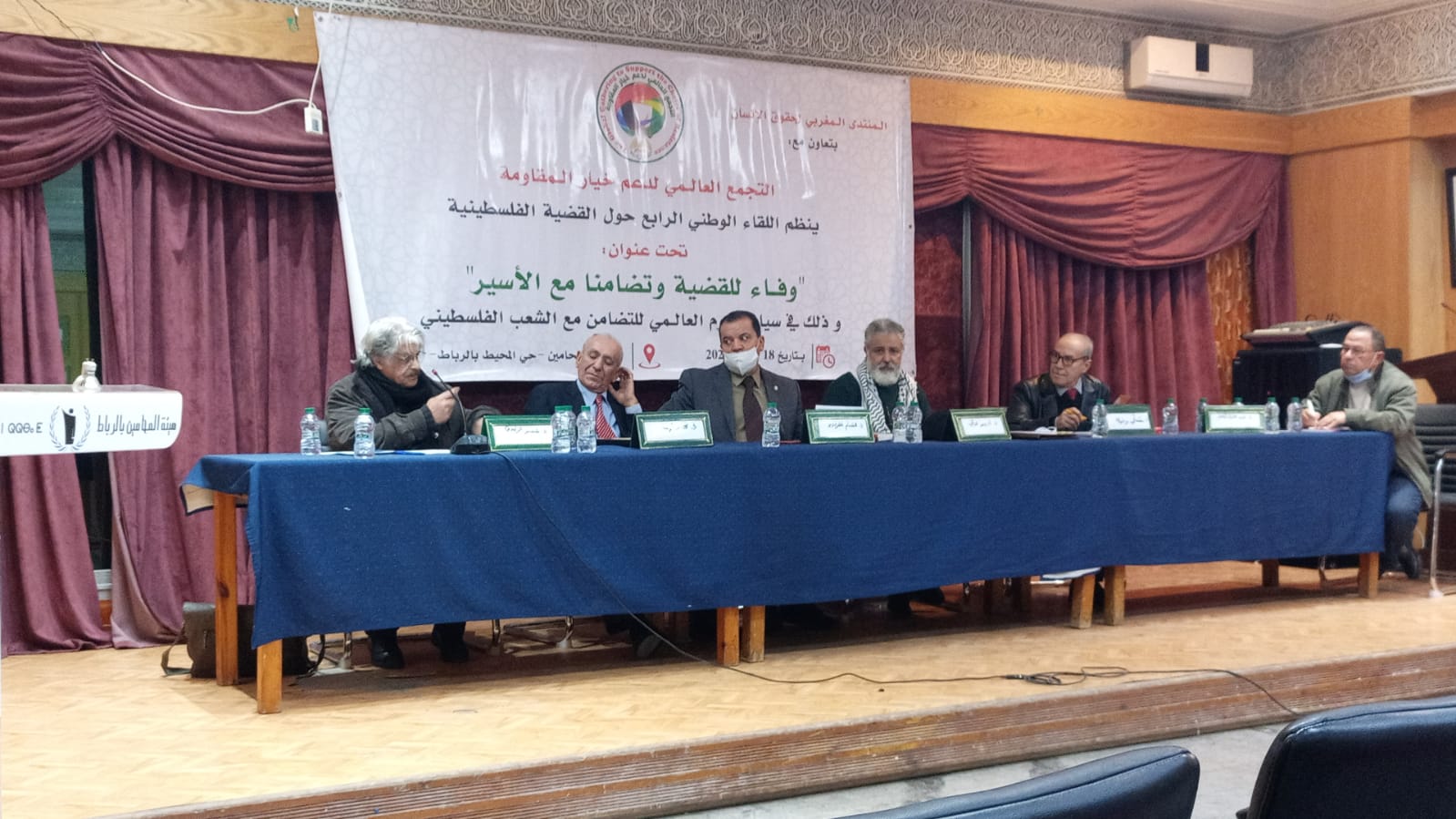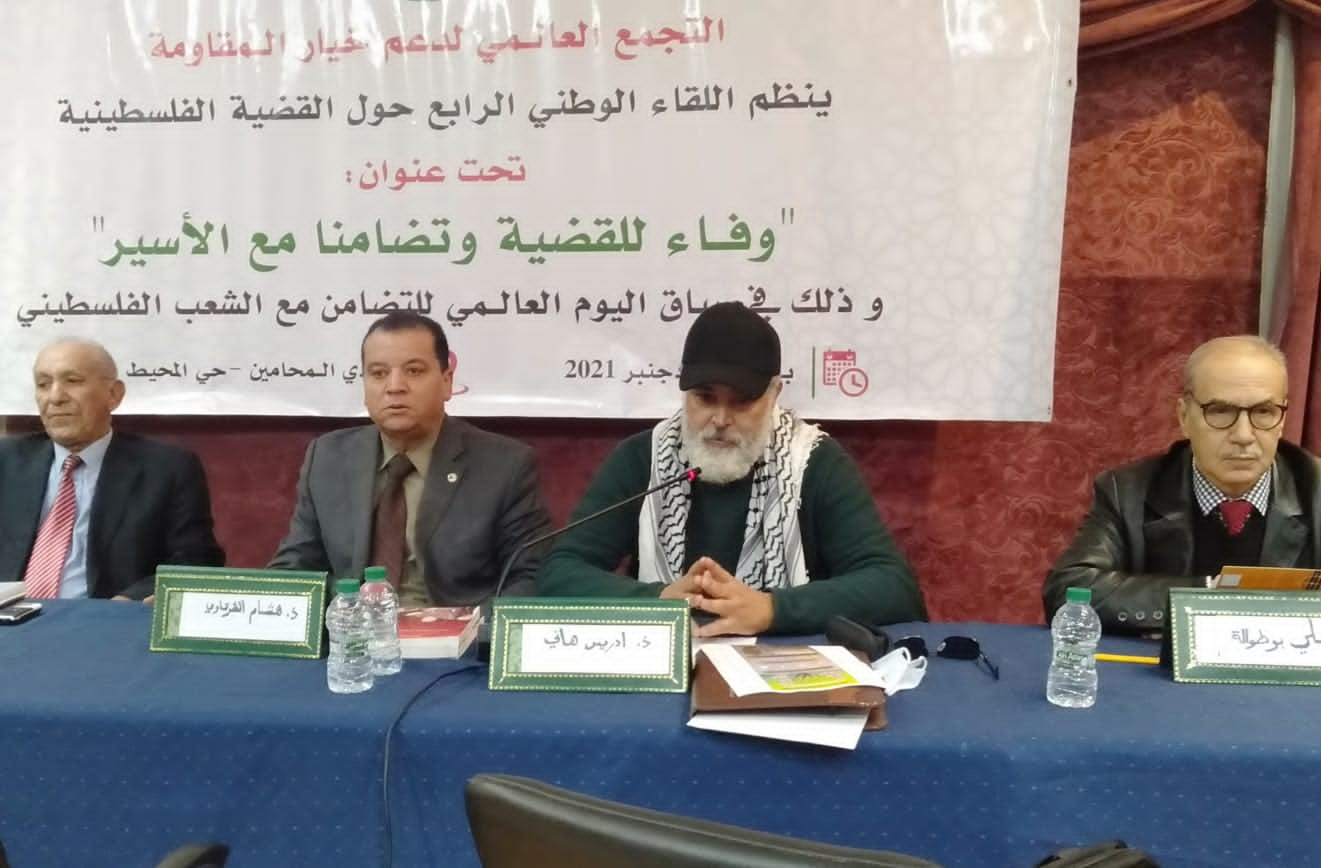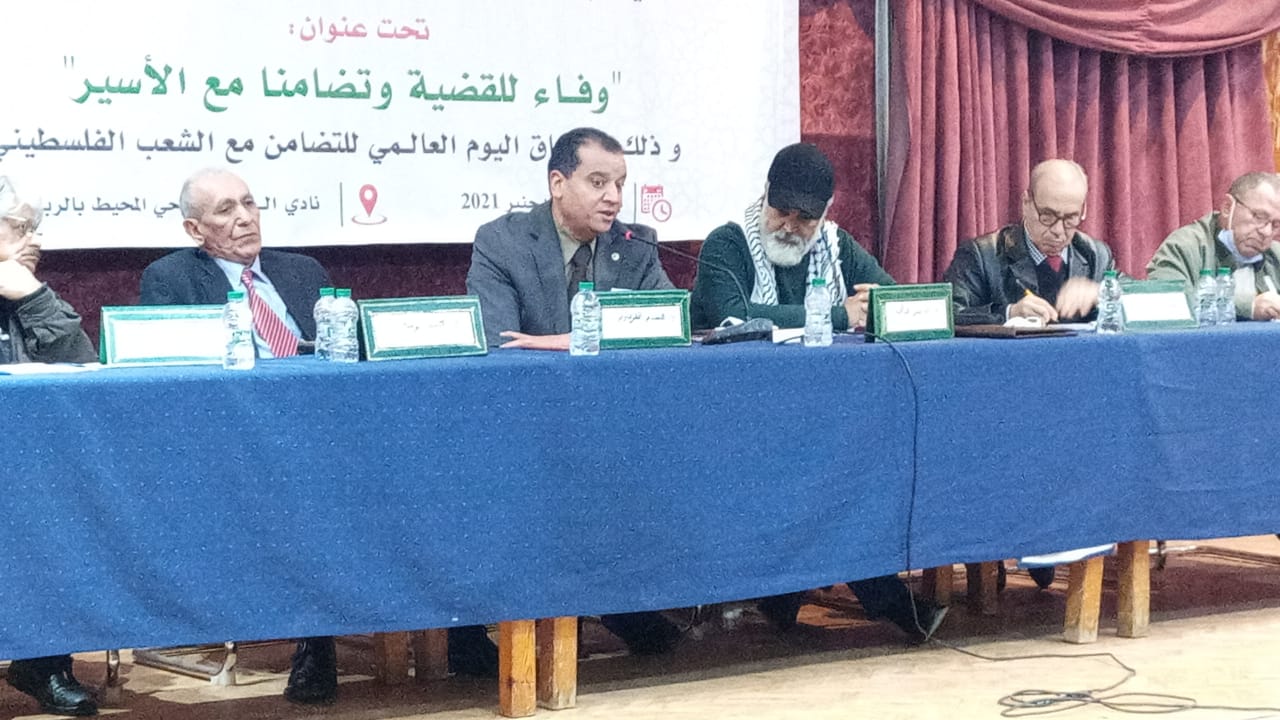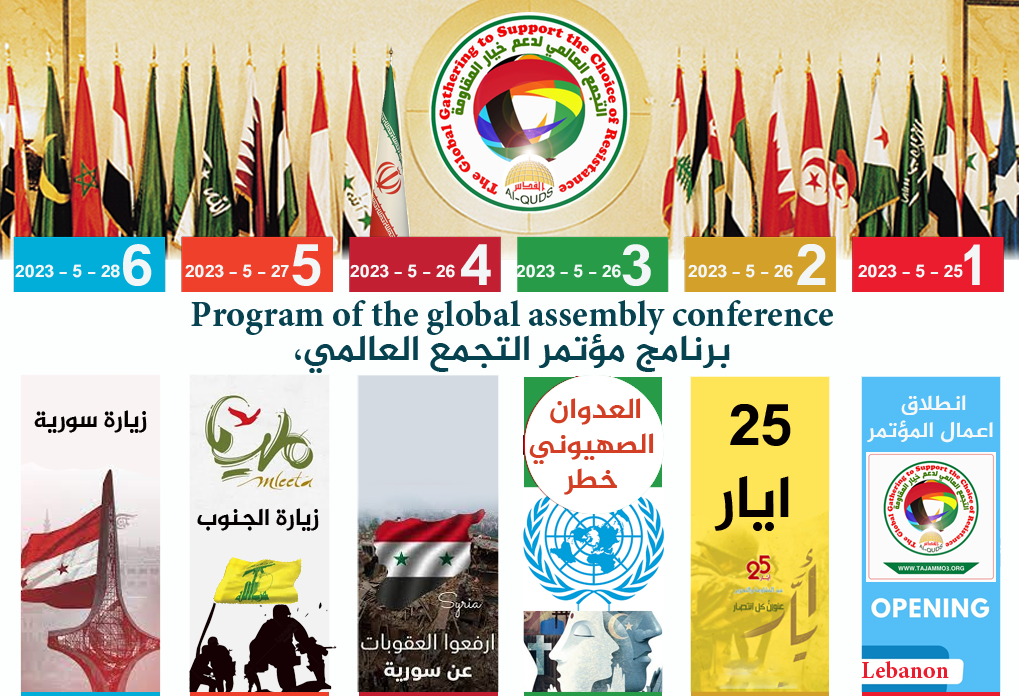In the same context of the International Day of Solidarity with the Palestinian People

In the same context of the International Day of Solidarity with the Palestinian People, the lecture hall of the Lawyers Club witnessed on Saturday (18/12/2021), the work of the fourth national meeting on the Palestinian cause, at the invitation of the General Coordinator of the Global Gathering in Support of the Choice of Resistance / in Morocco, under the title (Loyalty to the Cause And in solidarity with the prisoner), despite the severe restrictions as a result of the measures and procedures, foremost of which are health procedures.

The meeting was attended by a group of activists, political actors and researchers, as it was framed by:
Driss Hani as General Coordinator of the Global Gathering in Support of the Resistance Option – Morocco
Ali Boutawala as Secretary General of the Social Democratic Vanguard Party
Muhammad Loma is a researcher in the history of the national movement and the Liberation Army
Omar Al-Zaidi as president of the Citizenship and Ecology Action Association
Hisham El Sharkawy as Regional Coordinator of the African Network for International Criminal Justice
Abdelhafid Oualalou as Vice President of the Moroccan Association for Supporting the Palestinian Struggle
The participants sought to present a vision on the developments of the Palestinian issue, as was the desire of the participants not to repeat themselves in this meeting, and to try to search for innovative approaches and solutions.

In the opening speech, Driss Hani addressed the importance of the Palestinian issue for Moroccans, pointing to the historical, social and political depth, and the fact that it has become part of the Moroccan social component. He referred to the stations and samples that chronicle this relationship before the British Mandate, which goes back centuries, as he dealt with examples of trips and the exchange of certificates between Moroccan and AlQuds scholars, and pointed to many documented details of a scientific nature, to conclude that the legitimacy of the Palestinian struggle exceeds any other of the sources of legitimacy, not historical, not religious, not political and contractual, all of these are just a predicate of legitimacy and not its source, its source is the same opposite, that is, the occupation.
He also considered Palestine as oppressed, which in his view is nothing but oppressed, and he does not imagine him otherwise, even in the wildest of imagination and possibility, where he said: “Today we study the developments of the Palestinian cause, and we realize that we are a segment within an entire society that retains this cause with special loyalty. It is a just cause, for a people that are oppressed.”
Hani considered that saying that we are not concerned with this issue and it is not one of our priorities, that this leads to the collapse of the structure of values and principles on which world peace is based, justifying this with the International Covenant on Civil and Political Rights itself, which makes the issue of self-determination, with its clarified paragraphs, an issue that concerns all members of the United Nations. He considered that the Palestinian cause is the main of all national causes. Solidarity with the Palestinian prisoners was considered an urgent issue, especially as it is the most prominent title of the Palestinian struggle today.
Then the General Coordinator of the Global Gathering in Morocco gave the floor to Professor Mohamed Loumah, a researcher in the national movement and the Liberation Army, and one of the former fighters who worked in the camps of the Popular Front, where he touched on the first diplomatic victories achieved by the Fatah organization, referring to the plan dealt with by the martyr Abu Iyad, which accordingly, the Palestinians’ desire to extract recognition at one of the Arab summits was fulfilled, that the Palestine Liberation Organization be the sole legitimate representative of the Palestinian people. Loumah referred to his comrade, whose fate is unknown, according to the statement of the Equity and Reconciliation Committee, who is called al-Safini, which in the opinion of Loumah constituted what led to a kind of rivalry between Abu Iyad and the al-Faqih al-Basri, while Loumah considers Salah Khalaf’s plan an indication that he is a statesman with distinction.
After that, Mr. Ali Boutawala, Secretary-General of the Social Democratic Vanguard Party and representative of the Arab Progressive Front, presented an integrated approach, in which he laid out the international and regional geopolitical context, which constituted a pressing factor to enter into wrong political choices and the slide of normalization that poses a threat to the region, and will lead to more problems, including the threat of Arab countries.
Boutawala’s intervention dealt with the real causes that resulted in all the fears, and he considered that there is no way out except to make the Palestinian cause at the center of the conflict and restore the concept of the Arab renaissance. Boutawala presented the issue of Palestinian prisoners, and the measures that were addressed in several forums on prisoners, to move the file of the Palestinian prisoner.
In the same context, the paper of Professor Omar Al-Zaydi, the activist and researcher in the Palestinian cause and ecology, dealt with the need to search for new mechanisms to develop Palestinian work. He reviewed the stages of transformation in the Palestinian cause, starting from Black September and passing through the occupation of Lebanon to Oslo. He explained that what we are experiencing today is not new, but rather the outcomes of Oslo itself, and that the region will be exposed to new waves of normalization. He confirms that the United States of America has not left the Middle East, explaining that there is a repositioning, as happened in Syria, which is being subjected to Israeli aggression.
Al-Zaydi pointed to the contradictions of Arab policies and their role in the negative impact on the Palestinian situation, pointing to the danger of normalization, especially social normalization. Al-Zaidi pointed out that Lebanon, in this context, is on the verge of collapse, relying on one of the approaches that talk about the five stages of collapse, including the collapse of finance and citizens’ loss of confidence in banks, in addition to the economic and political collapse.
Then the word was addressed by Dr. Abdelhafid Olalou, Vice President of the Moroccan Association for Supporting the Palestinian Struggle, which revolved around the centrality of the Palestinian cause, and that this centralization still exists, confirms that any crisis in Gaza or Jerusalem affects the world, so we find protests even within the United States of America, as we find It resonates even within the US Congress, which confirms the importance and centrality of the issue. In turn, he addressed the issue of prisoners and the settlements, as well as every act of solidarity with the Palestinian cause. He emphasized a number of achievements, including that in one of the international forums, when the discussion about Palestine emphasized that it was only a refugee issue, the Progress and Socialism Party was among those who voted that it was an issue of national liberation. He considered that the aforementioned issue should be approached in a geostrategic context as an issue of national liberation.
Eat Dr. Hisham Al-Sharqawi, the case from the angle of international law, where he stressed a number of legal points neglected by those working on the Palestinian cause, especially in The Hague Court, and the failure to activate some provisions that are still not activated, in order to criminalize the occupation, including the separation fence. He pointed out that the West supports the occupation, but Western civil society is against the occupation, and the evidence for this is that officials in the occupied entity beat a thousand accounts to visit European countries, due to the presence of arrest warrants. He pointed out the danger that the Middle East and North Africa region has become the safest region for the movement of officials in the occupied entity, due to the absence of activating these criminalization laws. He also suggested to the Global Gathering, the Progressive Front, and all those working in the field of the Palestinian cause to pay attention to those details that his paper dealt with in detail.
In conclusion, the participants thanked the organizing body, and also agreed on the difficult situation the Palestinian cause is going through, and they also agreed on the need to develop mechanisms of solidarity with the Palestinian cause, stressing its centrality and the legitimacy of the Palestinian struggle and resistance, and the dangers of the policy of normalization, as they considered it, despite its danger, is not It has a horizon, as they agreed that the Palestinian cause, as it was present in the Moroccan conscience, will remain so, and it rises to the rank of the national cause.
